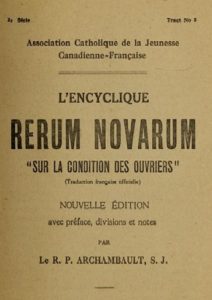125 years of Rerum Novarum
 May 15, 2016 marked the 125th Anniversary of Rerum Novarum, widely considered the foundation of modern Catholic social teaching. In this 1891 Encyclical, Pope Leo XIII examined the industrial revolution in light of Christian teaching on justice. Finding that the traditional economy of small property owners (farmers and artisans) was giving way to an economy dominated by a few property owners and a large working class, the Holy Father criticized the laissez-faire economy and gave a strong endorsement to trade unions. But where contemporary socialists anticipated ever-increasing class struggle, Leo believed that labor unions could play a positive role – like their medieval predecessors, the guilds, they could defend the economic interests of the workers, advance the quality of their trade, and provide an opportunity for labor and management to adjust disputes in the common interest.
May 15, 2016 marked the 125th Anniversary of Rerum Novarum, widely considered the foundation of modern Catholic social teaching. In this 1891 Encyclical, Pope Leo XIII examined the industrial revolution in light of Christian teaching on justice. Finding that the traditional economy of small property owners (farmers and artisans) was giving way to an economy dominated by a few property owners and a large working class, the Holy Father criticized the laissez-faire economy and gave a strong endorsement to trade unions. But where contemporary socialists anticipated ever-increasing class struggle, Leo believed that labor unions could play a positive role – like their medieval predecessors, the guilds, they could defend the economic interests of the workers, advance the quality of their trade, and provide an opportunity for labor and management to adjust disputes in the common interest.
For more on Rerum Novarum and its successors, check out our page Six Key Church Documents Addressing Labor. And don’t miss Catholic Social Teachings Call to the Dignity of Creation, a thoughtful essay by NY State AFL-CIO President Emeritus Denis Hughes and CLN member Fr. Brian Jordan!

For those interested in a fuller interpretation of Rerum novarum and its successor documents, may I be forward enough to suggest my recent work, Catholic Labor Movements in Europe: Social Thought and Action 1914-1965. Washington, D.C.: Catholic University of America Press; 2015. 341 pp. This may be too much for a personal possession, but should be available in a library you use. For a short introduction and recommendation, see John A. Coleman SJ in Theological Studies 77 (2016), 519-21.